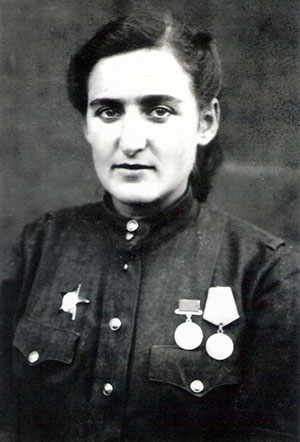Genia Tkach was born in 1919 in the Jewish agricultural colony of Novopavlovka in the Odessa Region. Her father was a leatherworker. Later, as a communist, he became head of a Jewish kolkhoz [collective farm]. However, following a deterioration in the relations with the local Ukrainian peasants, the Tkach family moved to Zaporozhye.
In 1937, having completed school, Genia passed the entrance exams for the Kiev Medical Institute.
On June 22, 1941, when Germany invaded the USSR, Genia Tkach had just completed her fourth year of study at the Institute. Kiev was heavily bombed from the first days of the war. In early July, the first Junkers aircraft was shot down, and it was exhibited in the city center to raise the morale of local residents. However, with the enemy closing in, panic gripped the city. Genia and her fellow students were busy digging trenches and anti-tank moats on the approaches to Kiev. Shortly thereafter, the Medical Institute was evacuated to Kharkiv; then, following the rapid advance of the Wehrmacht, it was relocated further eastward, to Chelyabinsk. The wartime curriculum placed a particular emphasis on field surgery and the rendering of first aid in battlefield conditions.
In August 1942, having graduated from the Institute, Genia Tkach was drafted into the Red Army as a 3rd-class army medic and dispatched to the Leningrad Front. In January 1943, she took part in an operation intended to lift the Siege of Leningrad. The medical platoon in which she served followed the advancing troops, picking up the wounded and evacuating them to the nearby battalion medical station. The patients had to be treated under enemy fire. After this ambitious operation, the greatly depleted unit in which Genia served was attached to a reformed rifle division. Tkach was appointed a physician at the shock ward. That ward would often receive hopeless, mortally wounded patients who were in need of surgery and urgent blood transfusions. Genia Tkach operated on them as an assistant surgeon. Occasionally, she had to treat injured German officers. At first, she balked at this duty, unable to overcome her loathing of them. However, when the officer of the Special Department who served in her battalion threatened to court-martial her, she had to obey. She was shocked at the good condition of the German patients, who were well fed and supplied with warm clothes, in stark contrast to the Red Army soldiers.
In winter 1944, during battles near Gatchina, Genia Tkach was gravely wounded when a mine directly hit the tent in which she was treating patients. She was evacuated to a hospital in Leningrad, where she had two fingers on her right hand amputated. The resulting disability would greatly hinder her subsequent career. Following her recovery, Tkach stayed on at that hospital, serving as a physician until the end of the war. Over its course, she was awarded the Order of the Red Star and some medals.
In December 1945, Genia Tkach was discharged from the Red Army with a second-class disability. She later returned to the Zaporozhye Region, where she worked at a rural hospital for 14 years. She then moved to the city of Zaporozhye, where she served as head of a therapeutic department for 30 years.







